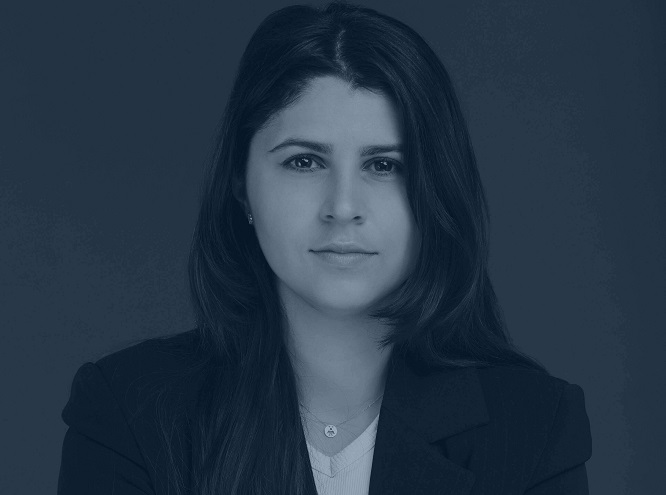“The need will teach you what to do”
A man drives into the woods and his vehicle breaks down. He remembers his father telling him: “Should this ever happen, the Need will teach you what to do”. He calms down and waits for the Need to come to fix his vehicle. The day goes by and he gets impatient as the Need does not show up. He starts calling out the Need, thinking the Need will reach him faster. After shouting for a while, he kneels down and starts working on the broken vehicle. He hurts his hand, improvises, fails and tries again until he finally manages to fix the broken car. That’s when he realizes “the Need” is not a person, but a situation, and the only one who needs to act and fix it is him.
The story of the Need best describes Alexandra Petrus’s professional trajectory. She has built a career in a variety of technical fields, ranging from cloud and apps to fintech and Artificial Intelligence (AI), all with the aim of helping businesses reinvent themselves through meaningful products. In 2017, she saw a need to help spread tech knowledge and, fueled by her passion for technology, she co-founded Bucharest AI, a regional community enabling people to apply Artificial Intelligence.
We spoke with Alexandra about AI trends and how to find the energy to reinvent yourself and persevere.
Are AI chat bots sexist?
Apparently, they can be(come). “For AI projects, inclusiveness is highly important and we must build solutions that work for everyone, no matter the gender, race or ethnicity. We have seen a few public attempts of technologies going rogue, such as the Microsoft Tay chatbot that built its own “politically incorrect” tweets or algorithms that can make a biased recruitment selection depending on gender”. In addition to inclusiveness, fair and explainable AI systems are all important things to consider in any AI-fueled project. “Having consistency across the three verticals, and fully considering the interests, rights and perspectives of all stakeholders is a hard job. The unicity of dealing with AI absolutely needs cross-functional teams, hence diversity is a strong aspect of this new era,” Alexandra explains.
When it comes to AI, there is also a need to develop further ethical standards. The Google Pair + AI Team are doing great efforts in this direction, the European Union is setting up guidelines of ethical AI and China is already taking action on its AI Development Strategy. We are on the verge of a new era, but are we equally involving men and women in the discussion and decision making process?
“The AI Now Institute shows us that, as of April 2019, 18% of authors at leading AI conferences are women, 80% of AI professors are men and that 15% of AI Research staff at Facebook and 10% at Google are women. The numbers tell a clear story: we have to make more efforts towards improving the balance. Women have a more empathic understanding of applications, users and behaviors, they approach the problem from a broader angle and communicate in encouraging ways. Another pattern which I observe in women-led groups is that collaboration comes more natural, and this is a particular aspect that we are missing in a new AI era.”
Romania’s AI landscape
After two years of running the Bucharest AI community, Alexandra is convinced that Romanians’ strong math backgrounds, the ability to learn fast, re-qualify and stay flexible, their contributions on Kaggle, stackoverflow and other similar communities and a good gender balance are key strengths at local level.
Naturally, there is also room for improvement: “We need better knowledge of the business world and of market regulations. We also have a long history of outsourcing in Romania which limits our understanding towards why we build, who we serve and what else is important to synchronize when building a product”. Also, while agility is important, the rush to be the first to develop something can become a disadvantage if the validation or documentation of the problem solving approach are not properly done.
Say NO often, say YES even more
Finding her North was not always an easy journey. With lots of discipline, guided by her inner values compass and inspired by her family, Alexandra built enough resilience to reinvert herself and always strive for more impactful things.
She shares below a few of the most important guiding aspects that helped her:
- Focus on your strengths, and not on your weaknesses.
- Allow yourself space for failures (as the stepping stone towards success) and exploration.
- Develop early a compass of your own values (mine are K.I.F.F: Kaizen for continuous improvement; Innsaei - co-creation with the environment; Friendship; Fairness).
- Believe in yourself and don’t neglect your personal life. It can be easy to put on hold any personal aspects as you experience the professional FOMO (Fear Of Missing Out), but putting your personal life on hold can make your professional struggles seriously harder at times.
- Have a mentor to keep you accountable and have a long term plan allowing you to iterate or pivot if needs be.
- Find inspiration in the little things.
She feels like a leaf in a tree. Is it a tree that will live for 10, 100 years or more? We are willing to bet the answer is “more”.
 Global Women TechLeaders
Global Women TechLeaders
